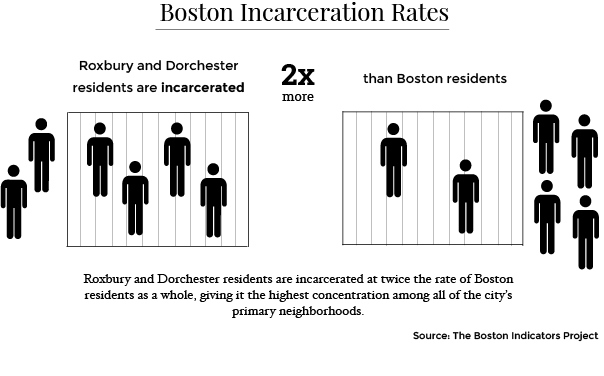
Lower-income Boston residents in communities of color are disproportionately impacted by incarceration, according to a report presented Thursday titled “The Geography of Incarceration.”
Roxbury and Dorchester residents are incarcerated at double the rate of Boston residents as a whole, according to the report.
The study, which investigated the trends of crime and incarceration in Boston, was conducted by Massachusetts Institute for a New Commonwealth and the Boston Indicators Project, which is a data project housed at The Boston Foundation, according to TBF spokesperson Keith Mahoney.
Mahoney said the study was conducted with the assistance by Suffolk County Sheriff Steve Tompkins’ office.
“[They] worked with Sheriff Steve Tompkins’ office on getting a data set that showed where individuals were living, when they went into either the House of Corrections or the Suffolk County Jail, and where they were when they came out,” Mahoney said. “It was mapping intake and outtake data that the sheriff’s office provided.”
Although a number of different statistics in the report are troubling, Mahoney said he was not surprised by the findings.
“In Franklin Field, more than one in five male residents between 25 and 29 were incarcerated, and in Grove Hall it was one in six,” Mahoney said. “This is consistent with some national trends of incarceration rates in communities of color.”
City Councilor Tito Jackson praised the report for providing information that could help strengthen the commonwealth.
“It is enlightening and really shows that we are not making progress but that we are actually falling behind in many neighborhoods and communities in the City of Boston,” he said.
Jackson explained the information in the report should not remain isolated in Roxbury and Dorchester.
“The people worried about this should not only be in Roxbury, Dorchester and Mattapan because the economy of the City of Boston and the state of Massachusetts is based on human capital,” he said. “The economy here is based on smart people who are doing innovative and smart things.”
Jackson said the City Council has been working with Tompkins in order to help people assimilate back into life after being released from jail and to keep them from being incarcerated again, by connecting them with resources in the city.
“We know that if an individual stays out of jail for 36 months, then their chances [of being incarcerated] go down to a person that has actually not been incarcerated,” he said.
Ben Forman, the research director at MassINC, said he encourages legislators to revisit policies currently in place, as they are not producing positive outcomes.
“There’s a lot of talk about how we divert people out of the criminal justice system before they spiral deeper into it,” he said. “We know that that can be effective, but it requires resources to do that work, and to the extent that we have those resources available to us, we should put them in these communities first because they’re the ones that have passed this tipping point.”
Several Boston residents expressed varying opinions on the findings of the study.
Carrie He, 32, of Roxbury, said she notices economic inequality and stigmas surrounding Roxbury and Dorchester, and the city needs to work to resolve these issues.
“We could definitely spend a lot more money on education in Boston, starting from preschool onward,” she said. “It would be more effective to focus on supporting families rather than just individual children. Everything is linked together.”
Ryan Polsinello, 23, of Fenway, said even in light of the report, he does not think stigmas exist towards certain Boston neighborhoods.
“I don’t think there’s a stigma,” he said. “With all of the racial tensions and just things going on in the United States right now, that probably is just causing a little more tension than usual and maybe getting those more intense or aggressive reactions to everything.”
Michael McCoy, 23, of Dorchester said legislators should put forth alternative solutions to incarceration, such as community service.
“It’s not so much that they need to rehabilitate themselves inside of a facility, but rehabilitate themselves in their natural settings,” McCoy said. “If you have more of a community feel, then people are actually going to worry about their neighbor and not just themselves.”

















































































































